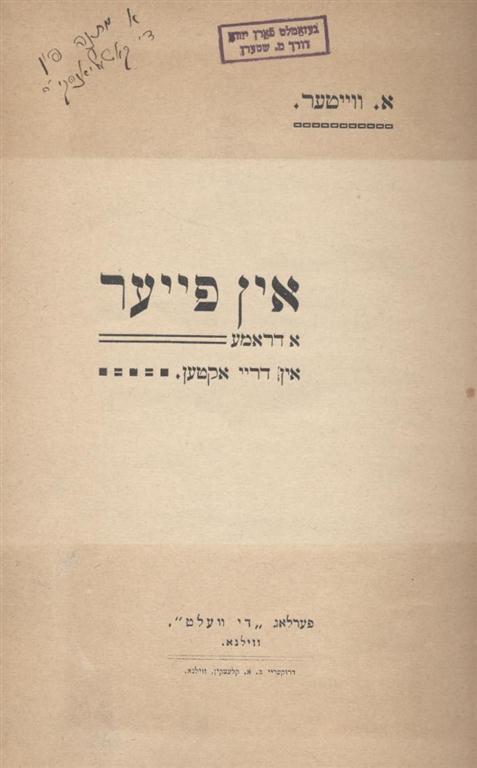
IN FAYER: A DRAMA IN DRAY AKTEN
Vilna; Ferlag ‘di Velt’; Vilner Farlag Fun B. A. Kletskin, [1910]. Item #32143
Later boards. 8vo. 78 pages. 22 cm. First edition. In Yiddish. ‘In Fire’, a drama in three acts. ’ Written by A Vayter (also Waiter; pseudonym of Ayzik Meyer Devenishski; ca. 1878–1919) ; “Yiddish writer, political activist, and cultural figure. Born in a shtetl in the Vilna region to a strictly observant family that operated a tavern, Ayzik Meyer Devenishski received a traditional Jewish education. In his youth, he became familiar with Haskalah literature, and later studied Russian and Polish literature and the works of radical and revolutionary thinkers. Devenishski left the traditional world and joined the Bund at the time of its inception. He was active in Kovno, Minsk, and Vilna under his party pseudonym “Comrade Aron, ” and endeavored to strengthen the national elements of the Bund platform. Devenishski was arrested several times and exiled to Siberia. When his term of exile was over, Devenishski settled in Vilna in 1905, where he contributed to the local Russian press. He played a central role in the revolutionary events of 1905 in Vilna. In 1906, he began his career as a Yiddish writer with a short story under his new pseudonym, A. Vayter, and from then on his literary work was increasingly important to him. Vayter’s transition from political to cultural activities is seen as emblematic of significant circles of the Jewish intelligentsia after the failure of the first Russian Revolution. Along with Shmuel Niger and Shemaryahu Gorelik, Vayter coedited the pioneering journal Literarishe monatshriftn (Literary Monthly) in 1908; he wrote its manifesto postulating a renaissance of Jewish culture and calling for the return of Jewish intelligentsia to it. Vayter also began writing plays, among which Der shtumer (The Mute; 1912) became popular and was produced often, mainly by amateur theater groups. His plays and short stories focus on the disillusionment of modern Jewish intellectuals as they tried to find a way back to traditional yidishkayt. In that period, he also showed great interest in modern Yiddish theater, both in his critical essays and reviews and through his organizational work with Y. L. Peretz and other writers. From 1909 to 1911, Vayter was on the editorial staff of Der fraynd, where he published—among other pieces—the first review of Dovid Bergelson’s literary debut. In 1911, Vayter became the manager of the B. Kletskin publishing house in Vilna, considered from the very beginning to be the preeminent Yiddish publishing house in Eastern Europe. In 1918, Vayter returned to Vilna after several years of Siberian exile. He was very involved in Yiddish cultural activities that had taken root there during the months of Bolshevik rule. When the Poles entered Vilna in April 1919, they carried out a bloody pogrom, and Polish legionnaires executed Vayter by firing squad after falsely accusing him of being a Bolshevik. The memory of his murder became a symbol reminding Jews both of the brutal antisemitic attitude on the part of Poles in the first months of Poland’s independence and of the specific problems that characterized the situation of Jews in Vilna between the two World Wars. This symbol was embodied in the monument at Vayter’s grave in the Jewish cemetery in Vilna. Immediately following the author’s death, Vayter-bukh: Tsum ondenk fun Vayter (Vayter Book: In Memory of Vayter; 1920) was published under the editorship of Shmuel Niger and Zalmen Reyzen. In 1923, Vayter’s Ksovim (Writings) were published with a comprehensive introduction by A. Y. Goldshmidt—the most important source on Vayter’s life and work. His three plays were published in separate editions. ” (Yivo Encyclopedia of Jews in Eastern Europe; A Vayter) Errata slip inserted. Subjects: Yiddish Drama. OCLC lists 10 copies. Light wear to boards, later endpages aged and chipped; otherwise very clean and fresh. Good + condition. (SPEC-36-55).
Price: $500.00

